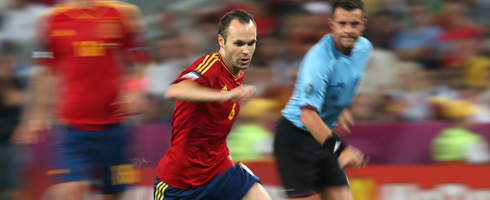“Andres doesn’t dye his hair, doesn’t wear earrings and hasn’t got tattoos. That makes him unattractive to the media but he’s the best player I have ever seen,” once commented Pep Guardiola about Barcelona and Spain midfield magician, Andres Iniesta.
Iniesta hails from the sleepy village of Fuentealbilla, deep in Don Quixote’s La Mancha. In literary terms, he is the ultimate anti-hero. Just 5ft7 tall, small and clean cut, Iniesta has mesmerised opponents and thrilled the fans alongside Xavi Hernandez in midfield for club and country. A creative genius, stylish and unassuming, with a phenomenal work rate and a technique developed from childhood.
For his sheer technical precision and his ability to control the ball and the game, 28-year-old Iniesta is without peer in the modern game – except perhaps for Xavi, his partner in crime. He is a constant menace with the ball, whether deep in midfield, picking out the killer pass or arriving in and around the box at the right time to score a crucial goal, as he did in the 2010 World Cup Final.
Although Iniesta scored the extra-time winner against the Netherlands in South Africa, his more familiar role is setting up chances for others. “I don’t need to score goals,” was his unselfish response. “It’s not what football is about to me. It doesn’t matter who scores so long as we do.”
Iniesta’s passing and dribbling ability and an amazing football brain form the nerve centre of the all-conquering La Roja as well as the Blaugrana, together with his ability to control the tempo of the game and create chances for his teammates. “He is the complete footballer. He can attack and defend, create and score,” said Vincent del Bosque of Iniesta, and he should know.
Sir Alex Ferguson once said: “I don’t think Iniesta and Xavi have ever given the ball away in their lives. The way Iniesta finds passes, his movement and ability to create space is incredible.” The superlatives are supported by statistics. Iniesta’s passing accuracy and assist ratio speak volumes. He averages over 2,000 passes per season, against an average of 650 in La Liga, and around 47 accurate passes per game, compared to the Primera average of 26.
Named player of the tournament at Euro 2012, as Spain completed their famous treble, Iniesta was at the heart of La Roja’s success. “In many ways, he symbolised the tournament – the creative, incisive runner, with and without the ball,” according to UEFA technical director Andy Roxburgh.
Iniesta’s ultimate contribution to Spain’s triumph at Euro 2012 earned him the Man of the Match award in the 4-0 win over Italy in the final, his characteristic through-ball playing in Cesc Fabregas to set up David Silva’s 14th-minute opener. With typical modesty, the midfielder preferred to remember his team’s overall success: “Today the team played a great match. All the players were at their best and we’re delighted.”
Iniesta would be an inspired and in many ways brave choice to win the Ballon d’Or, but he is realistic about his chances. “Anyone would love to be there,” he told Sid Lowe in a Guardian interview last weekend. “Recognition is the World Cup and the European Championships. It’s a team sport and they are the team prizes. But of course it would be nice.”
It would also be a recognition of the pure football values of hard work, commitment and a team ethic. Iniesta’s technical brilliance, unselfish approach and resilience have quietly helped club and country achieve greatness, while the man himself shuns the plaudits. A worthy winner indeed.

